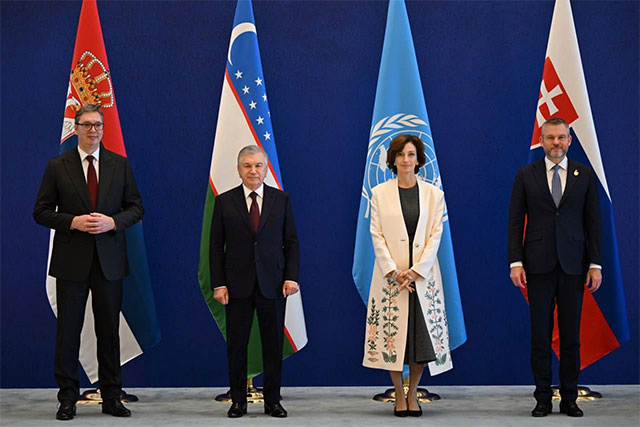
President of Uzbekistan Emphasizes UNESCO’s Role in Global Cooperation
President of Uzbekistan Emphasizes UNESCO’s Role in Global Cooperation
Tashkent, Uzbekistan (UzDaily.com) — On 30 October, President of the Republic of Uzbekistan Shavkat Mirziyoyev took part in the opening ceremony of the 43rd session of the General Conference of the United Nations Educational, Scientific and Cultural Organization (UNESCO) in Samarkand.
The head of state warmly welcomed the participants, highlighting the hospitality of the Uzbek land — a crossroads of cultures and civilizations — and expressed his appreciation to the President of Serbia Aleksandar Vučić, the President of Slovakia Peter Pellegrini, UNESCO Director-General Audrey Azoulay, heads of foreign governments, representatives of international and regional organizations, and delegations for attending the conference.
President Mirziyoyev noted that this session is being held outside UNESCO headquarters in Paris for the first time in 40 years, reflecting the trust of member states in the comprehensive reforms being implemented in Uzbekistan. He emphasized UNESCO’s role as an authoritative global institution promoting international cooperation in education, science, culture, and information, while strengthening trust and solidarity among nations.
The President highlighted the symbolic significance of holding the forum in Samarkand, renowned as a center of humanistic ideas and inter-civilizational dialogue. He recalled the city’s rich heritage, including the Mirzo Ulughbek Observatory, which laid the foundation for the discoveries of Copernicus and Kepler, and urged conference participants to embrace the spirit of Samarkand — a jewel of the Great Silk Road.
In his address, Mirziyoyev underscored the negative impact of geopolitical tensions and military conflicts on cultural heritage, as well as the global inequalities arising from limited access to knowledge and digital technologies. In this context, he stressed the importance of strengthening solidarity and international cooperation.
The President outlined Uzbekistan’s five-year cooperation program with UNESCO through 2027, which includes anniversaries of prominent scholars and thinkers such as Abu Rayhan Beruni, Ahmad Fergani, Amir Timur, Ali Kushchi, and Kamoliddin Behzod, as well as commemorative dates of scientific institutions and literary landmarks. The program also covers World Heritage sites in Khiva, Bukhara, Shakhrisabz, and Samarkand, along with natural territories in the Western Tien Shan and the Turan deserts.
Mirziyoyev recalled that around twenty elements of Uzbekistan’s intangible heritage have been recognized by UNESCO, including Shashmaqam music, Katta Ashula, the Lazgi dance, Askiya art, miniature painting, the Navruz celebration, and traditional silk and atlas weaving. Under UNESCO’s auspices, festivals of maqom, bakhshi, folk crafts, and ethnosports are conducted.
Special attention was given to Uzbekistan’s initiatives, including the “Khiva Process” for promoting international cooperation in Central Asia, the “Tashkent Declaration on Early Childhood Education,” and the “Tashkent Declaration on Access to Information.” The country hosts UNESCO chairs and partner schools, and Tashkent and Fergana are part of the Global Network of Learning Cities. Hundreds of cultural heritage sites have been restored according to international standards and modern technologies.
The President presented several new initiatives: the development of inclusive education using artificial intelligence, the creation of a UNESCO platform for children with special needs, a World Summit on Vocational Education, the pilot project “AI – School,” and the International Forum of Experts on AI Ethics.
Significant emphasis was placed on preserving intangible cultural heritage, including the “Memory of the World” program, protection of oral folk traditions, manuscripts, and archives, as well as the establishment of the International Institute of Digital Heritage. President Mirziyoyev proposed declaring November 19 as International Document Heritage Day and hosting the International Congress on Crafts and Folk Arts in Bukhara in 2027.
In the field of gender equality and women’s leadership, he proposed creating a UNESCO Academy for Women’s Leadership and organizing a Global Women’s Forum in Samarkand with participation from international experts, educators, and artists.
The President also stressed the need for joint efforts to combat the climate crisis, proposing the creation of the “UNESCO Environmental Capital” initiative and drafting an Executive Board resolution on the protection of cultural heritage amid globalization. Key priorities include countering disinformation, promoting media literacy, protecting public opinion, and combating discrimination.
Shavkat Mirziyoyev underscored the importance of strengthening interfaith harmony and countering radicalism, calling for the promotion of tolerance, mutual understanding, and social cohesion. He highlighted the potential of Uzbek cultural projects, including the Center for Islamic Civilization and research centers dedicated to Imam Bukhari, Imam Maturidi, Imam Termizi, and Bahauddin Naqshband.
Concluding his address, the President expressed confidence that the forum would serve as an important step in strengthening global partnership, trust, and sustainable development. He emphasized the symbolic significance of holding the conference in Samarkand, a city of peace, friendship, and mutual understanding.
The opening ceremony concluded with a concert featuring domestic and international artists, presenting the finest examples of Uzbek classical music and global musical heritage performed by a symphony orchestra, choir, and national ensemble.
#Shavkat Mirziyoyev